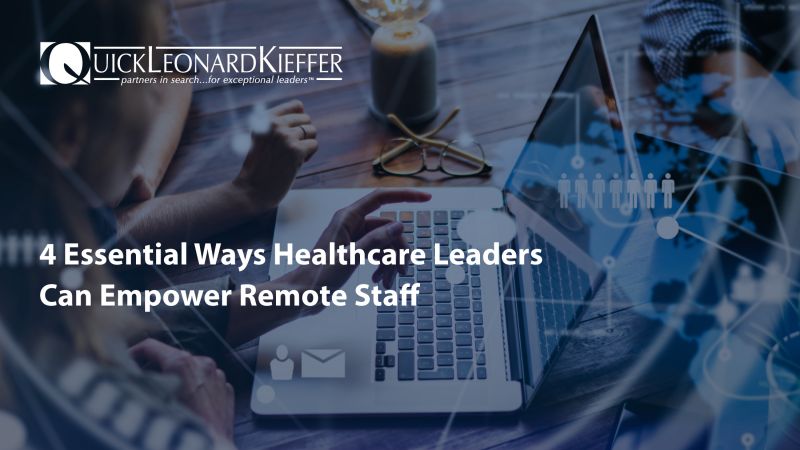We’ve all witnessed firsthand the many ways in which both our personal and work lives have radically shifted from the versions that existed in early 2020. You’re likely experiencing one of them while you read this: working from home. Now more than ever, employees from different sectors, including healthcare, are spending most of their time working remotely, which isn’t entirely newsworthy as we creep our way through 2021. But, it is worth considering, in light of recent events, working from home is much less a passing novelty and much more a fundamental characteristic of work moving forward—and it’s time to plan accordingly.
As a healthcare leader, you need a sound empowerment plan to nurture the general wellbeing, productivity, and development of your remote staff.
Here’s a few below.
How Healthcare Leaders Can Empower Remote Staff
Outlined below are 4 surefire tips you can use to empower your remote staff.
Enabling Professional Autonomy
A study by Gerdenistch and others found that remote employees exhibit better performance when they have more control of their work.
By enabling professional autonomy, you give your remote healthcare workers the free will to operate and make decisions regarding their job descriptions based on their professional knowledge base.
And while this approach may seem contradictory to the notion of centralized leadership, when done accordingly, it can go a long way in boosting the independence of your remote workers.
Therefore, professional autonomy creates conducive remote working conditions that motivate your staff to work towards the set organizational goals.
However, this kind of freedom should go hand in hand with accountability. The remote employees enjoying professional autonomy should be fully accountable for their actions.
It’s important to note that professional autonomy works well when dealing with professionally qualified healthcare workers.
Providing Necessary Tools and Infrastructure
Provision of the right working tools is part of structural empowerment. Therefore, you should invest in the right tools and technology vital for the smooth flow of remote operations.
For instance, software and other digital tools to help remote staff access and share information as well as communicate flawlessly with their colleagues and clients. However, it’s advisable to offer sufficient training to up-skill employees’ expertise in using these tools.
Besides, you can help your remote workers acquire user-friendly office equipment for their home offices, such as ergonomic chairs, desks, computers, and stable internet connectivity, to mention a few.
And while office equipment may be overlooked, it plays a vital role in creating a conducive working environment that motivates or empowers remote workers.
Maintaining Communication
WFH strips employees of the privilege of informal and bond-building communication with colleagues, leaving some of them feeling isolated and disengaged.
Therefore, it’s your responsibility as a healthcare leader to foster communication among your remote staff to keep them empowered.
You can maintain communication and contact by:
- Scheduling regular face-to-face or virtual meetings and weekly check-ins to allow employees to air their issues
- Encouraging virtual team-building activities to foster connections among your remote staff
- Relaying regular feedback and acknowledging employees’ achievements.
- Establishing a hotline or contact point to provide immediate responses to employees’ challenges
- Encouraging peer support through team-based leadership
For efficient communication among remote workers, you need to equip your team with virtual communication apps such as:
- Zoom
- Google Meet
- Slack
- Skype, etc
Providing Mental Health Support
Despite its flexibility, working from home poses a threat to employees’ mental health. A survey by Springworks in 2020 revealed that 60% of remote workers felt lonely and isolated. 45.7% of them missed their social connections at work, while 40% did not know how to maintain a healthy lifestyle.
Such cases of isolation and disconnection can trigger psychological stress among remote workers.
Therefore, supporting your employees on mental health issues contributes to their psychological empowerment.
You can provide mental health support by organizing virtual coaching programs on mental health. Regular check-ins can also help monitor the workers’ mental wellbeing. Moreover, you can promote accountability groups where team members look out for each other.


